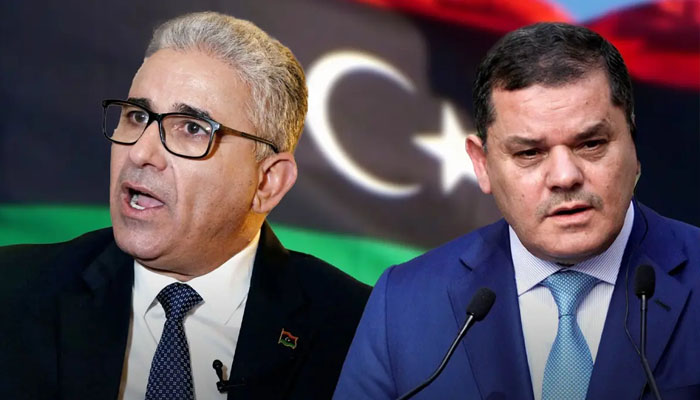Bashagha accuses Dbeibeh of financial corruption, threatens to cut oil revenues

The Libyan government appointed by the House of Representatives, headed by Fathi Bashagha, on Saturday accused the national unity government headed by Abdul Hamid Dbeibeh of committing financial irregularities and threatened to stop oil revenues for the accounts of the institution that manages the sector, in a new escalatory step that would deepen the political deadlock and hinder the efforts of the UN envoy Abdoulay Bathelli to end the crisis in the country.
This was revealed in a letter sent by the Minister of Planning and Finance in the government appointed by the Council of Representatives, Oussama Hammad, to the Attorney General, the Chairman of the Administrative Control Authority, the Chairman of the Audit Bureau, and the Chairman of the Anti-Corruption Commission, which was published on the official Facebook page of the Ministry.
“We inform you of the financial irregularities committed by the outgoing Prime Minister of National Unity (referring to Dbeibeh) on December 28, which are added to other irregularities committed against the Libyan forces,” the letter said.
“Dbeibeh received (deportation) more than 16 billion and 500 million dinars ($3.2 billion) from Title III allocations without legal support,” Hamad said in the letter.
The Minister of the Government of Bashagha refers to this fact revealed by activists two days before Dbeibeh was to carry a financial sum from the 2022 general budget to 2023.
“What Dbeibeh did was intended to avoid returning the amount to the General Reserve Account at the end of the year as required by legislation,” Hammad said.
“The National Oil Corporation played a pivotal role in breaking the law by providing the Ministry of Finance’s accounts in the national unity government with financial coverage from oil revenues deposited with the Libyan Foreign Bank,” he said.
“We will resort to a series of escalatory measures to stop the flow of revenues from oil and gas sales to the bank account of the SAMA to protect these funds from being wasted,” Hamad threatened, without elaborating.
He called for “launching an extensive criminal and administrative investigation into the matter, and initiating criminal and disciplinary proceedings against the outgoing Prime Minister of National Unity and all his accomplices in the aforementioned incidents, and holding legal responsibility and the consequences for the violators.”
On September 29th, the Minister of Finance in the Bashagha government called on the governor of the Bank of Libya, which is part of the national unity government in Tripoli, Al-Sidiq Al-Kabeer, “to transfer the revenues mentioned in the budget law to the accounts of the Ministry of Finance as soon as they are deposited in the bank accounts, and not to transfer them to any parallel bodies.”
Observers say the conflict between the Bashagha and Dbeibeh governments over oil revenues is the most serious and advanced stage, as it is the oil revenues that are being spent on education, health and all aspects of life in Libya.
Since 17 April, Libya’s oil sector has seen a wave of closures of oil fields and ports by tribal groups in the south, center, southwest and east in protest at Dbeibeh’s failure to hand over power to the Bashagha government.
The Libyan government is vying for power from the internationally recognized Dbeibeh government, which refuses to hand over power except to a government appointed by a new elected parliament.
Amid disagreements, the two governments are wrestling with public revenues, particularly the oil money the country relies on to finance its public budget, while UN-sponsored efforts to achieve a Libyan consensus on a constitutional basis for elections to resolve the crisis have stalled.
The international community is unanimous in its view that maintaining the independence of the oil institution and the fair distribution of its revenues, which represent 90 percent of the state budget, is one of the most important bases for resolving the Libyan crisis.
All state revenues, especially oil, which underpins the state budget, were channeled into the Central Bank in Tripoli, Libya, but since July, oil revenues have been deposited into the Foreign Bank accounts and are almost frozen because of the conflict.
The freezing of those revenues is in accordance with a US plan, unveiled by US Special Envoy to Libya Ambassador Richard Norland, to freeze Libyan oil revenues until a Libyan committee is formed to oversee the equitable disbursement of those revenues in Libya in accordance with the principle of managing Libya’s financial resources in a transparent manner so that no party in the conflict can benefit from it according to that plan.
Although the U.S. plan was not accepted by the Libyans, it was actually implemented and the oil revenues were booked at the Libyan Foreign Bank, but its arrival at Dbeibeh’s government, despite the freeze imposed on it, raises many questions.
The American plan was for the money not to reach either of the two rival governments until the committee was formed, but to reach the Dbeibeh government that will use it to its advantage, and nothing will reach the areas that are not under Dbeibeh’s control, such as the eastern or southern region.
Libyan political circles believe that the US plan to freeze oil revenues at the Libyan Foreign Bank seemed from the outset to be a false idea, especially since the Libyan Foreign Bank is run by Mohammed Ali Abdallah Addarrat, a senior member of the National Front for the Salvation of Libya, an Islamist organization very close to the Brotherhood in Libya.












